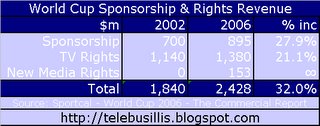The BBC site totally dominates Online World-Cup Viewing according to
figures released by Nielsen Netratings.
· 3,004,174 people in the UK visited a sports or gambling website the week that finished with the day England beat Ecuador in the first knock-out round (Mon 19th – Sunday 26th June)
· This figure represents a 51% growth in audience to sports and gambling websites over the last four weeks
· 1,015,707 people visited a sports or gambling website on the day of England’s game against Ecuador – beating the 979,188 who visited on the Saturday England played Paraguay in their opening match
· BBC Sport was again the most popular sports website, this time with 1,585,237 Unique Visitors – a 58% share of the weekly sports and gambling audience
To be fair, I think the BBC are doing quite a good job and being quite innovative by broadcasting the matches live over broadband. Also, if you look and compare the BBC site to the second place site, Sky Sports News it is immediately apparent why people prefer the BBC just on content alone. I’m also sure a lot of quality of the BBC Site is due to media rights: Sky have resorted to reproducing artists impressions of goals.
However, my questions are “Is the World Cup really something that should be covered by a Public Broadcaster?” and more importantly “Why is the BBC monopolising the online rights?”
On the Public Broadcasting side the BBC and ITV jointly secured the rights to the World Cup in 2002 and 2006 for £160m. Note, the World Cup is a “listed event” and therefore can only be broadcast on the BBC, ITV or Channel4.
In terms of overall rights, the UK is paying around 12% of total rights, depending upon your £:$ conversion rate.

The BBC/ITV has since secured the rights for the 2010 and 2014 World Cup as part of a not-so-mega €1bn bid securing the rights across the world of Europe. So the BBC and ITV coverage is here to stay and is secured through both a non-competitive and non-transparent tender process. As far as I am aware, ITV and the BBC have not revealed how much the rights cost them individually. Personally, I feel the “listed event” mechanism is just a process to remove Sky from the bidding and secure broadcast rights at a lower than market price.
However, the online rights are not covered by any “listed events” constraints and therefore theoretically could be purchased by anyone. Of course, the BBC does not reveal how much it paid for the on-line rights. BBC has huge advantages in terms of the size of team (300) that it has sent out to Germany and no doubt a certain proportion of these are employed fully on BBC New Media work. But, more importantly is the relentless cross-promotion on every World Cup show and on numerous adverts showing up and coming events in between normal BBC programming. Obviously, it would be impossible for a non-broadcaster provider to replicate this promotion. It is also noteworthy that ITV appear nowhere in the online market share world and have no video content, obviously they didn’t buy the “new media” rights. In fact it shows the strength of the SkySports brand that they are beating ITV hands down in the online world.
Personally, I think the BBC is being allowed to be too aggressive in the online space. They currently dominant the news category and I would hate to them expand into other categories.





<< Home